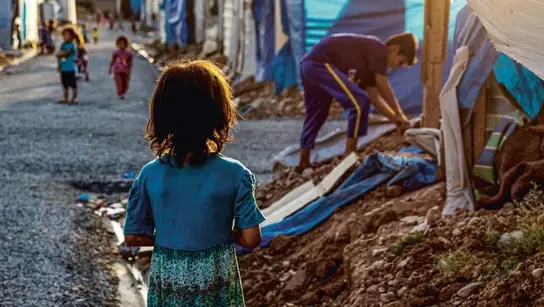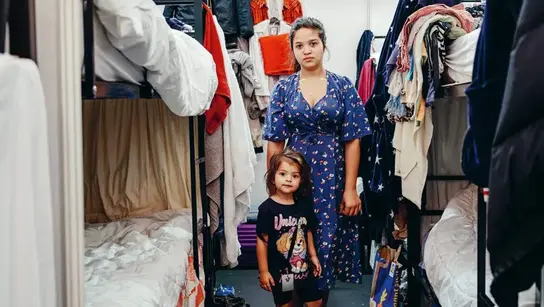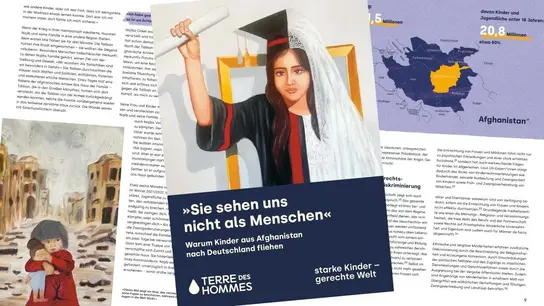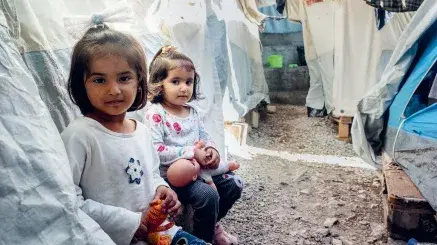Terre des Hommes Day of Action 2025
Nearly 50 million children worldwide are currently refugees – more than at any time since World War II. They are fleeing war, violence, persecution, poverty, or natural disasters. Most children flee within their own country or to neighboring countries. Only a small number come to Europe.
But while more and more children are forced to leave their homes, safe and legal routes of escape are becoming increasingly rare. Instead of offering protection and opportunities, many countries are closing their borders and their hearts.
On International Children's Rights Day, November 20th, we will take to the streets to send a clear message in support of the rights of refugee children and young people.
Terre des Hommes advocates for safe escape routes, reliable protection, and social inclusion for all children. Because every child counts – no matter where they come from!
Terre des Hommes demands:
In recent years, more and more governments have resorted to isolationist policies, claiming that this will limit "irregular" migration. However, they overlook the fact that there are hardly any legal pathways for children and families to flee their home countries in emergencies.
Admission programs from countries of origin, resettlement, and family reunification procedures enable children to escape war and persecution via legal rather than "irregular" and therefore dangerous routes. However, these programs are only available to a few and are increasingly being restricted – yet they urgently need to be expanded to protect children and their families.
Children and families fleeing crisis or war zones need reliable protection and real prospects. Precarious residency status and fear of deportation make it difficult for children to integrate into a new society and build a future.
Years of uncertainty often mean severe psychological stress. Refugee children must be able to build a future – for that they need reliable protection.
Children need more than a roof over their heads: they need a safe home, access to education, health and psychosocial care.
Children should also be able to help shape the societies in which they live – their voices and experiences must be heard in decision-making processes.

"When safe pathways are lacking, children are unprotected: they are exploited, held captive, or die. Anyone who obstructs legal pathways violates children's rights – and becomes complicit."
questions and answers
Like adults, children and young people are also fleeing wars and armed conflicts, lack of prospects and poverty, persecution and discrimination, as well as the effects of the climate crisis and environmental destruction in their countries of origin.
Typical reasons for children to flee include recruitment as child soldiers or the threat of recruitment upon reaching adulthood, as well as gender-specific practices such as forced marriage, FGM (female genital mutilation), and forced prostitution. Furthermore, children and young people are affected by specific forms of human trafficking, enslavement, and exploitative child labor.
Dangerous, “illegal” escape routes are often the only paths left for children and their families when fleeing conflict and persecution.
Safe and legal pathways for asylum seekers are scarce, and the few existing programs and regulations are being increasingly restricted worldwide. For example, the German Federal Government announced in its coalition agreement its intention to discontinue resettlement and admission programs and further restrict family reunification.
Children and families often have no other option but to embark on dangerous journeys. When they arrive in Europe, they have the right to have their asylum application examined. This fundamental right, too, is increasingly being called into question.
The vast majority of children and young people seeking protection in Germany travel with one or both parents. However, in recent years, nearly one-fifth of all first-time asylum seekers under the age of 18 have been so-called unaccompanied minors: they begin their journey alone or are separated from their families during their flight.
The reasons for fleeing without adults are varied and complex. A large proportion of unaccompanied minor refugees report having fled of their own accord – contrary to the common myth that "the young people are always sent by their parents." When parents support their children's flight, they by no means do so lightly: desperation and a lack of prospects lead them to accept their children's escape along dangerous routes.
Reception programs specifically open to vulnerable children and young people could spare children the dangerous journey and their families the anxiety and the forced reliance on smugglers and traffickers.
To travel on a scheduled flight, children and young people need a visa. This is only granted within the framework of humanitarian admission (i.e., through admission programs or family reunification procedures).
However, very few children in war zones and crisis areas have access to these safe escape routes: governments worldwide are increasingly restricting these legal access routes.
It is more often (but not exclusively) boys and young men who set out alone on the dangerous escape routes.
Access for girls to escape routes and support systems is often severely restricted, and the same legal violations that cause girls and young women to flee – such as forced marriage, sexualized and domestic violence, and massive disenfranchisement – simultaneously make it more difficult for them to leave.
Reception programs specifically open to particularly vulnerable groups are therefore especially important: they ensure that those who are particularly threatened can escape.
Spread our message & demands
on WhatsApp and social media
Letter campaign: Keep your acceptance promises!
It is a particularly acute example of blocked escape routes that endanger children's lives: the current actions of the German government, which is breaking its promises to take in people from Afghanistan who face persecution, violence and death there – because they have, for example, stood up for human rights or cooperated with Europeans and Americans.
We therefore want to use the day of action to specifically call on members of the Bundestag to respect children's and human rights and to advocate for compliance with the admission commitments.
Would you like to get involved? Feel free to contact us:
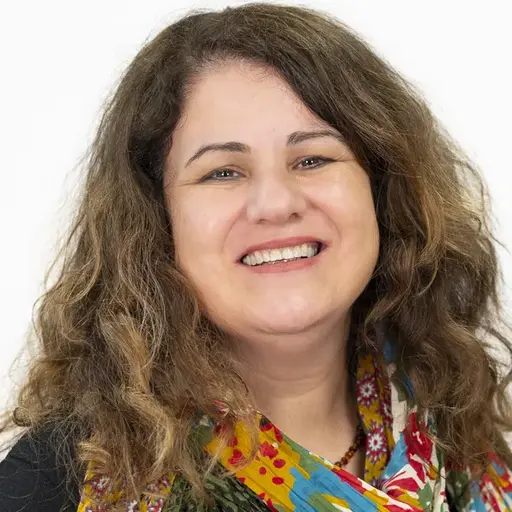
Ana Jacinto
Speaker active commitment

Heike Knöpke
Processing commitment
